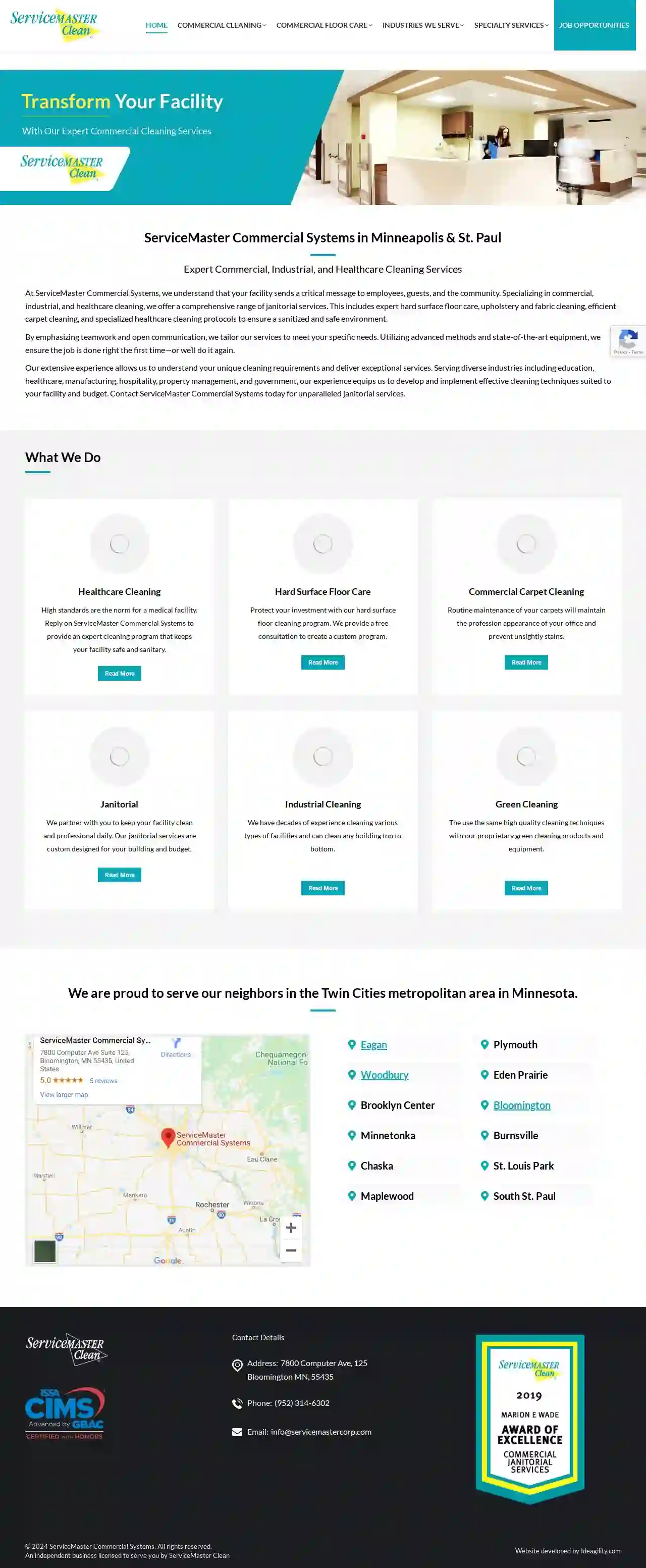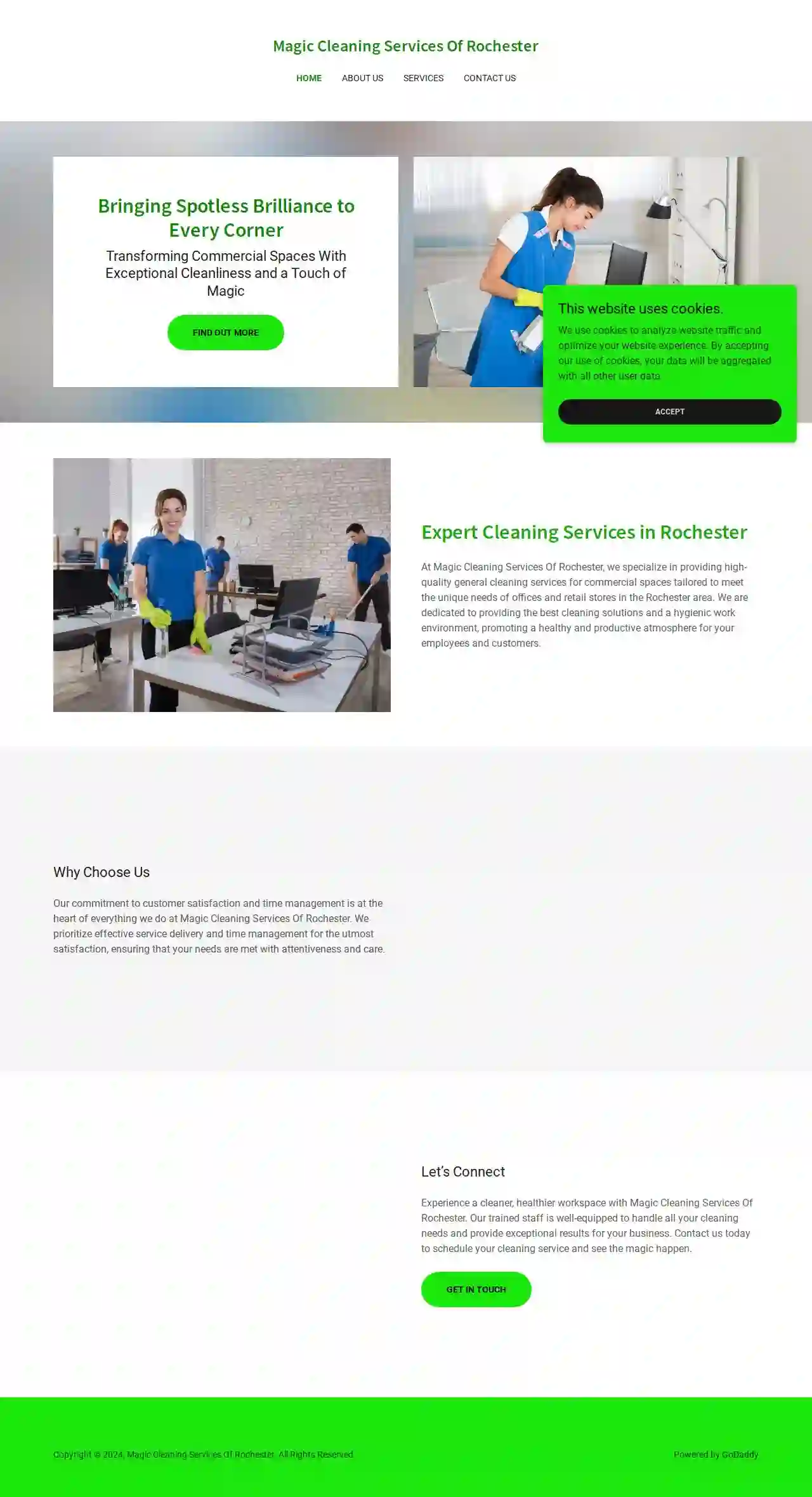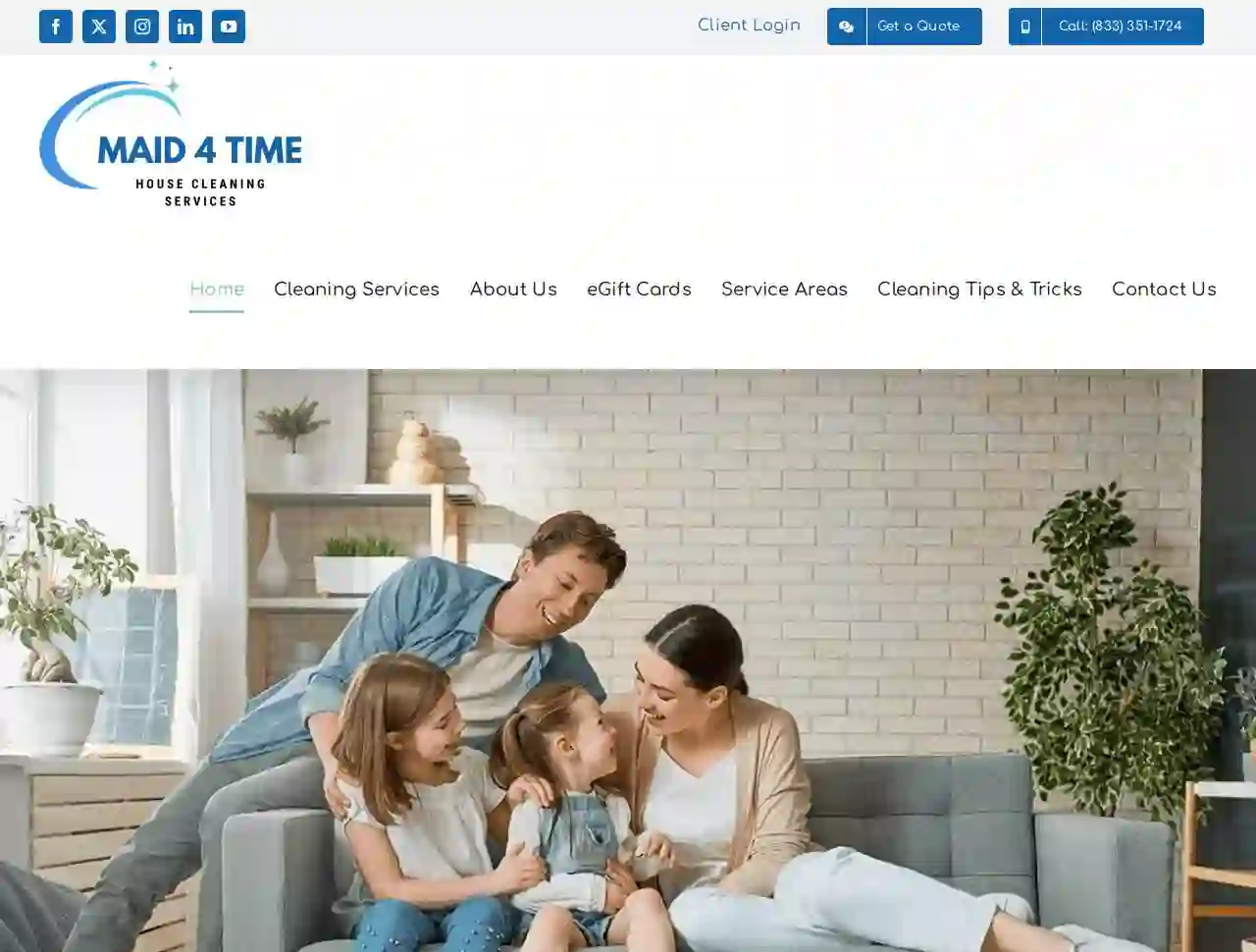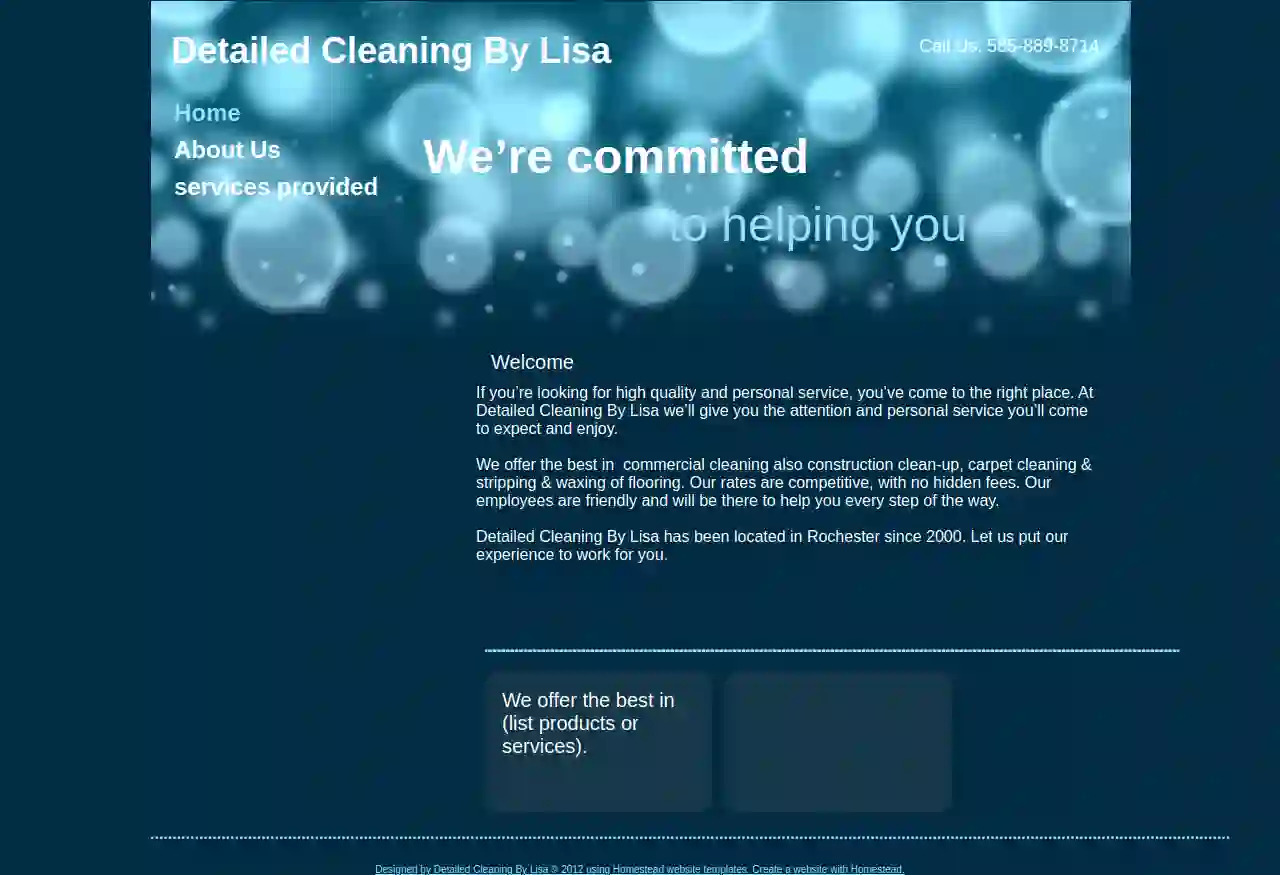Cleaning Services Mound
Find the best House Cleaning in Mound
Receive 3 FREE House Cleaning quotes for your project today! Compare profiles, reviews, accreditations, portfolio, etc... and choose the best deal.
Service Needed
City or Town

ServiceMaster Commercial Systems
4.610 reviewsMinneapolis, US- Services
- Why Us?
Get Quote
Vividly Clean
4.614 reviewsMinneapolis, US- Services
- Why Us?
Get Quote
The Common Good Cleaning Company
516 reviewsMinneapolis, US- Services
- Why Us?
Get Quote- Ab
Abi's Custom Cleaning, LLC
3.85 reviewsMinneapolis, US- Services
- Why Us?
Get Quote 
Anago of St. Paul
4.86 reviewsMinneapolis, US- Services
- Why Us?
Get Quote- Re
Redd's Janitorial Service LLC - Quality Commercial Cleaning Company, Office Cleaning Service
4.76 reviewsMinneapolis, US- Services
- Why Us?
Get Quote 
Magic Cleaning Services of Rochester
513 reviewsRochester, US- Services
- Why Us?
Get Quote
Maid 4 Time
4.8333 reviewsRochester, US- Services
- Why Us?
Get Quote- Te
Team Cleaning Services-Twin Cities, Mn
519 reviewsMinneapolis, US- Services
- Why Us?
Get Quote 
Detailed Cleaning By Lisa
53 reviewsRochester, US- Services
- Why Us?
Get Quote
Over 60,241+ Janitorial Contractors on our platform
Our janitorial contractors operate in Mound & surroundings!
CleaningMatch has curated and vetted Top Janitorial Companies in Mound. Find a reliable business today.
Frequently Asked Questions About Cleaning Services
Find answers to common questions about cleaning services and hiring cleaning companies in the USA.
- Blot, don't rub: When treating fresh stains, blot with a clean cloth or paper towel to absorb as much of the stain as possible. Rubbing can spread the stain and damage carpet fibers.
- Club Soda: For spills like wine or coffee, pour club soda on the stain, let it fizz, then blot with a clean cloth. Repeat if needed.
- Vinegar Solution: Mix equal parts white vinegar and water, apply to the stain, and blot. Vinegar helps remove stains and odors.
- Baking Soda Paste: Make a paste with baking soda and water, apply to the stain, let it dry, then vacuum. Baking soda absorbs odors and lifts stains.
- Commercial Carpet Cleaner: : Use a commercial carpet cleaner according to the instructions. Choose a cleaner specifically designed for the type of stain you're dealing with.
- Professional Carpet Cleaning: For stubborn or deeply set stains, consider hiring a professional carpet cleaning service. They have specialized equipment and expertise in stain removal.
- Residential Cleaning: Covers cleaning homes, apartments, and other living spaces.
- Commercial Cleaning: Focuses on cleaning offices, retail stores, and other business establishments.
- Deep Cleaning: A thorough and intensive cleaning that covers areas often neglected during regular cleaning.
- Move-In/Move-Out Cleaning: Comprehensive cleaning performed before or after moving into or out of a property.
- Post-Construction Cleaning: Specialized cleaning after construction or renovation projects to remove debris and dust.
- Specialized Cleaning: Includes services like carpet cleaning, window cleaning, upholstery cleaning, and more.
- Communicate clearly: Before the cleaning, communicate your expectations and any specific cleaning requirements. Provide a list of areas you want them to focus on or any tasks you want them to prioritize.
- Provide access: Ensure the cleaners have access to all the areas that need cleaning. Unlock doors, clear clutter, and provide any necessary instructions.
- Walk through after cleaning: Once the cleaning is complete, do a walk-through with the cleaners to inspect their work. Address any concerns or areas that need attention.
- Provide feedback: Give the cleaning service feedback on their performance. Let them know what you were happy with and any areas they can improve.
- Build a relationship: Establish a good relationship with the cleaning service by communicating openly, treating them with respect, and providing clear instructions.
- Dishes: Load the dishwasher or wash dishes by hand.
- Sink: Clean the sink with a sponge or cloth and dish soap. Pay attention to the faucet and drain. You can also use a baking soda paste to remove stubborn stains.
- Countertops: Wipe down countertops with a disinfectant cleaner or all-purpose cleaner.
- Stovetop: Clean the stovetop with a degreaser or stovetop cleaner. Remove burner grates and wash them separately if needed.
- Oven: Clean the oven according to the manufacturer's instructions. You can use a self-cleaning function or a commercial oven cleaner.
- Microwave: Clean the microwave interior with a damp cloth or sponge. For stuck-on food, heat a bowl of water with lemon juice in the microwave for a few minutes to loosen debris.
- Refrigerator: Wipe down the refrigerator shelves and drawers with a damp cloth or sponge. Remove any expired food and clean spills promptly.
- Floors: Sweep or vacuum the floor, then mop with a floor cleaner suitable for your kitchen floor type.
- Trash: Empty the trash can and recycling bin.
How can I get rid of tough stains on carpets?
Tough carpet stains can be challenging, but several methods can help:
Always test any cleaning solution on a small, inconspicuous area of the carpet first to ensure it doesn't cause discoloration or damage.
Always test any cleaning solution on a small, inconspicuous area of the carpet first to ensure it doesn't cause discoloration or damage.
What are the different types of cleaning services?
Cleaning services cater to diverse needs and offer a range of options, including:
The best type of cleaning service depends on your specific needs, the size and condition of the property, and your budget.
The best type of cleaning service depends on your specific needs, the size and condition of the property, and your budget.
How can I make sure my cleaning service does a good job?
To ensure a satisfactory cleaning service, follow these tips:
Clear communication, a thorough inspection, and constructive feedback are key to getting the best results from your cleaning service.
Clear communication, a thorough inspection, and constructive feedback are key to getting the best results from your cleaning service.
What is the most efficient way to clean a kitchen?
A clean kitchen is essential for food safety and a pleasant cooking experience. Here's an efficient kitchen cleaning process:
Regularly cleaning your kitchen helps maintain a hygienic and organized space for cooking and dining.
Regularly cleaning your kitchen helps maintain a hygienic and organized space for cooking and dining.
How can I get rid of tough stains on carpets?
Tough carpet stains can be challenging, but several methods can help:
Always test any cleaning solution on a small, inconspicuous area of the carpet first to ensure it doesn't cause discoloration or damage.
- Blot, don't rub: When treating fresh stains, blot with a clean cloth or paper towel to absorb as much of the stain as possible. Rubbing can spread the stain and damage carpet fibers.
- Club Soda: For spills like wine or coffee, pour club soda on the stain, let it fizz, then blot with a clean cloth. Repeat if needed.
- Vinegar Solution: Mix equal parts white vinegar and water, apply to the stain, and blot. Vinegar helps remove stains and odors.
- Baking Soda Paste: Make a paste with baking soda and water, apply to the stain, let it dry, then vacuum. Baking soda absorbs odors and lifts stains.
- Commercial Carpet Cleaner: : Use a commercial carpet cleaner according to the instructions. Choose a cleaner specifically designed for the type of stain you're dealing with.
- Professional Carpet Cleaning: For stubborn or deeply set stains, consider hiring a professional carpet cleaning service. They have specialized equipment and expertise in stain removal.
Always test any cleaning solution on a small, inconspicuous area of the carpet first to ensure it doesn't cause discoloration or damage.
What are the different types of cleaning services?
Cleaning services cater to diverse needs and offer a range of options, including:
The best type of cleaning service depends on your specific needs, the size and condition of the property, and your budget.
- Residential Cleaning: Covers cleaning homes, apartments, and other living spaces.
- Commercial Cleaning: Focuses on cleaning offices, retail stores, and other business establishments.
- Deep Cleaning: A thorough and intensive cleaning that covers areas often neglected during regular cleaning.
- Move-In/Move-Out Cleaning: Comprehensive cleaning performed before or after moving into or out of a property.
- Post-Construction Cleaning: Specialized cleaning after construction or renovation projects to remove debris and dust.
- Specialized Cleaning: Includes services like carpet cleaning, window cleaning, upholstery cleaning, and more.
The best type of cleaning service depends on your specific needs, the size and condition of the property, and your budget.
How can I make sure my cleaning service does a good job?
To ensure a satisfactory cleaning service, follow these tips:
Clear communication, a thorough inspection, and constructive feedback are key to getting the best results from your cleaning service.
- Communicate clearly: Before the cleaning, communicate your expectations and any specific cleaning requirements. Provide a list of areas you want them to focus on or any tasks you want them to prioritize.
- Provide access: Ensure the cleaners have access to all the areas that need cleaning. Unlock doors, clear clutter, and provide any necessary instructions.
- Walk through after cleaning: Once the cleaning is complete, do a walk-through with the cleaners to inspect their work. Address any concerns or areas that need attention.
- Provide feedback: Give the cleaning service feedback on their performance. Let them know what you were happy with and any areas they can improve.
- Build a relationship: Establish a good relationship with the cleaning service by communicating openly, treating them with respect, and providing clear instructions.
Clear communication, a thorough inspection, and constructive feedback are key to getting the best results from your cleaning service.
What is the most efficient way to clean a kitchen?
A clean kitchen is essential for food safety and a pleasant cooking experience. Here's an efficient kitchen cleaning process:
Regularly cleaning your kitchen helps maintain a hygienic and organized space for cooking and dining.
- Dishes: Load the dishwasher or wash dishes by hand.
- Sink: Clean the sink with a sponge or cloth and dish soap. Pay attention to the faucet and drain. You can also use a baking soda paste to remove stubborn stains.
- Countertops: Wipe down countertops with a disinfectant cleaner or all-purpose cleaner.
- Stovetop: Clean the stovetop with a degreaser or stovetop cleaner. Remove burner grates and wash them separately if needed.
- Oven: Clean the oven according to the manufacturer's instructions. You can use a self-cleaning function or a commercial oven cleaner.
- Microwave: Clean the microwave interior with a damp cloth or sponge. For stuck-on food, heat a bowl of water with lemon juice in the microwave for a few minutes to loosen debris.
- Refrigerator: Wipe down the refrigerator shelves and drawers with a damp cloth or sponge. Remove any expired food and clean spills promptly.
- Floors: Sweep or vacuum the floor, then mop with a floor cleaner suitable for your kitchen floor type.
- Trash: Empty the trash can and recycling bin.
Regularly cleaning your kitchen helps maintain a hygienic and organized space for cooking and dining.